- Home
- Quizzes
- My Quiz Activity
- Newsletters
- MY FAVORITES
- Add Sports/Teams
- SPORTS
-
NFL
- NFL Home
- Arizona Cardinals
- Atlanta Falcons
- Baltimore Ravens
- Buffalo Bills
- Carolina Panthers
- Chicago Bears
- Cincinnati Bengals
- Cleveland Browns
- Dallas Cowboys
- Denver Broncos
- Detroit Lions
- Green Bay Packers
- Houston Texans
- Indianapolis Colts
- Jacksonville Jaguars
- Kansas City Chiefs
- Las Vegas Raiders
- Los Angeles Chargers
- Los Angeles Rams
- Miami Dolphins
- Minnesota Vikings
- New England Patriots
- New Orleans Saints
- New York Jets
- New York Giants
- Philadelphia Eagles
- Pittsburgh Steelers
- San Francisco 49ers
- Seattle Seahawks
- Tampa Bay Buccaneers
- Tennessee Titans
- Washington Commanders
-
MLB
- MLB Home
- Athletics
- Arizona Diamondbacks
- Atlanta Braves
- Baltimore Orioles
- Boston Red Sox
- Chicago White Sox
- Chicago Cubs
- Cincinnati Reds
- Cleveland Guardians
- Colorado Rockies
- Detroit Tigers
- Houston Astros
- Kansas City Royals
- Los Angeles Angels
- Los Angeles Dodgers
- Miami Marlins
- Milwaukee Brewers
- Minnesota Twins
- New York Yankees
- New York Mets
- Philadelphia Phillies
- Pittsburgh Pirates
- San Diego Padres
- San Francisco Giants
- Seattle Mariners
- St. Louis Cardinals
- Tampa Bay Rays
- Texas Rangers
- Toronto Blue Jays
- Washington Nationals
-
NBA
- NBA Home
- Atlanta Hawks
- Boston Celtics
- Brooklyn Nets
- Charlotte Hornets
- Chicago Bulls
- Cleveland Cavaliers
- Dallas Mavericks
- Denver Nuggets
- Detroit Pistons
- Golden State Warriors
- Houston Rockets
- Indiana Pacers
- Los Angeles Clippers
- Los Angeles Lakers
- Memphis Grizzlies
- Miami Heat
- Milwaukee Bucks
- Minnesota Timberwolves
- New Orleans Pelicans
- New York Knicks
- Oklahoma City Thunder
- Orlando Magic
- Philadelphia 76ers
- Phoenix Suns
- Portland Trail Blazers
- Sacramento Kings
- San Antonio Spurs
- Toronto Raptors
- Utah Jazz
- Washington Wizards
-
NHL
- NHL Home
- Anaheim Ducks
- Boston Bruins
- Buffalo Sabres
- Calgary Flames
- Carolina Hurricanes
- Chicago Blackhawks
- Colorado Avalanche
- Columbus Blue Jackets
- Dallas Stars
- Detroit Red Wings
- Edmonton Oilers
- Florida Panthers
- Los Angeles Kings
- Minnesota Wild
- Montreal Canadiens
- Nashville Predators
- New Jersey Devils
- New York Islanders
- New York Rangers
- Ottawa Senators
- Philadelphia Flyers
- Pittsburgh Penguins
- San Jose Sharks
- Seattle Kraken
- St. Louis Blues
- Tampa Bay Lightning
- Toronto Maple Leafs
- Utah Hockey Club
- Vancouver Canucks
- Vegas Golden Knights
- Washington Capitals
- Winnipeg Jets
- NCAAF
- NCAAM
- Olympics
- Boxing
- Entertainment
- Lifestyle
- Golf
- MMA
- Soccer
- Tennis
- Wrestling
- Sports Betting
- More Sports
- RESOURCES
- My Account
- YB on Facebook
- YB on Twitter
- YB on Flipboard
- Contact Us
- Privacy Policy
- Terms of Service
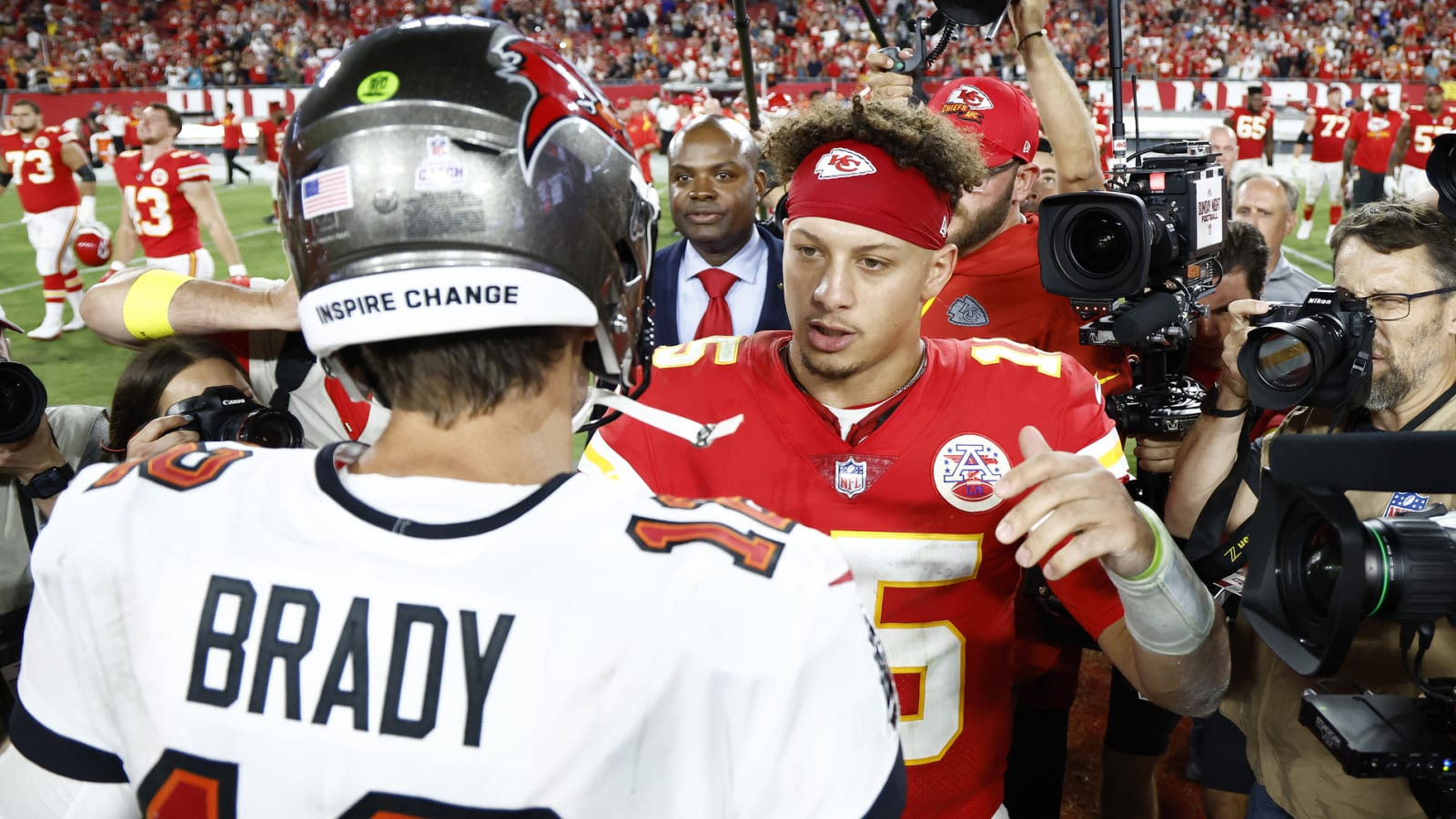
The greatest NFL playoff quarterbacks of all time
The NFL's biggest stars tend to shine brightest when the games matter most. Especially at the quarterback position. Here's our list, in alphabetical order, of the best postseason quarterbacks in NFL history.
Troy Aikman
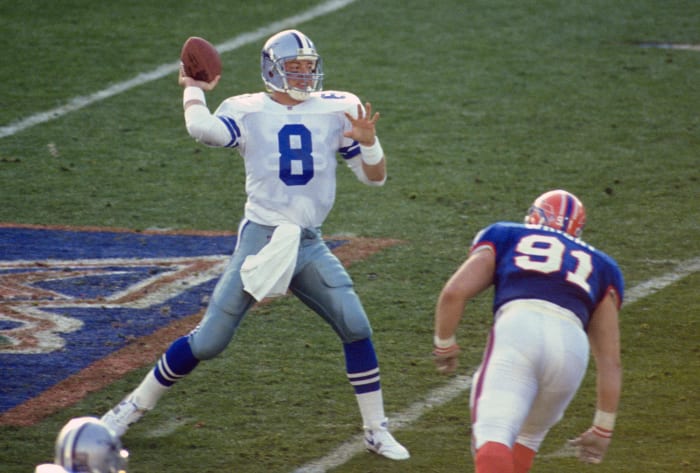
Sure, Aikman played alongside some of the game's offensive greats in Emmitt Smith and Michael Irvin. But, when it came to keeping the Dallas Cowboys' machine rolling during the playoffs, Aikman made it look easy -- and worth celebrating. He went 11-4 as a postseason starter and won all three of his Super Bowl starts, completing 63.6 percent of his passes. Aikman was named MVP of Super Bowl XXVII when he threw for 273 yards with four touchdown passes and no interceptions during the Cowboys' 52-17 rout of the Buffalo Bills.
Terry Bradshaw

The legendary Bradshaw is tied for second with four Super Bowl titles, and did so in as many trips with the Pittsburgh Steelers. A two-time Super Bowl MVP, Bradshaw is also tied for fourth with 14 playoff victories. While being compared to today's NFL star quarterbacks, Bradshaw's playoff numbers don't particularly stand out (he only completed 57.2 percent of his passes), but he threw 30 touchdown passes in 19 postseason contests. Bradshaw also had a stellar offensive supporting cast to work with, not to mention one of the greatest defenses in NFL history.
Tom Brady

At the moment, there's no argument that Brady is the greatest playoff quarterback in NFL history -- and perhaps the best ever to play the position at the pro level. He holds league playoff records by a quarterback for starts (48), wins by a starter (35), Super Bowl appearances (10), Super Bowl victories (seven) and Super Bowl MVPs (five), among many others. Brady, the only player in NFL history to win a Super Bowl with an AFC team (New England) and NFC squad (Tampa Bay), completed 62.5 percent of his playoff passes for records of 13,400 yards and 88 touchdowns.
Drew Brees
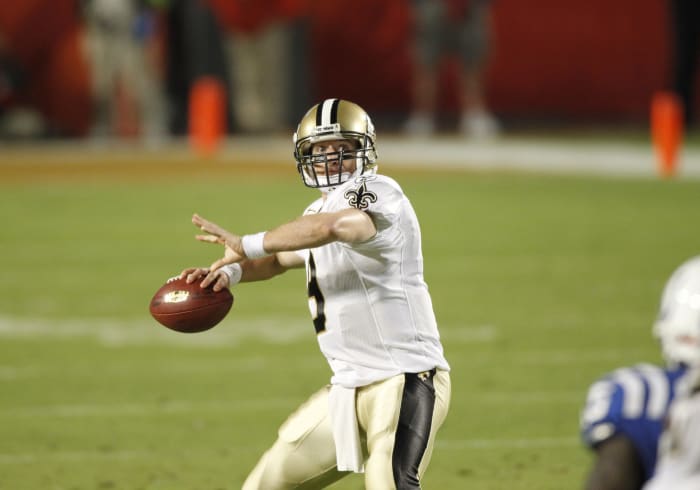
In his first five NFL seasons with the San Diego Chargers, Brees made just one playoff appearance. However, when he landed in New Orleans in 2006, he began his transformation into one of the game's greatest quarterbacks. Brees, who ranks second overall in career passing yards (80,358), touchdown passes (571), and pass completions (7.142), went 9-9 as a playoff quarterback. However, he's among the top 10 in career postseason completions (481), passing yards (5,366), passing TDs (37) and passer rating (97.1). Oh yeah, Brees was MVP of Super Bowl XLIV in the Saints' upset win over Indianapolis.
Len Dawson

In addition to being a three-time NFL champion for the Kansas City Chiefs (1962, 1966, 1969), Dawson earned MVP honors while the franchise won Super Bowl V. That came after Dawson and the Chiefs lost to Green Bay in Super Bowl IV. The Hall of Famer went 5-3 as a starter in the playoffs, throwing for nearly 1,500 yards with seven touchdowns. However, it was Dawson's leadership and ability to thrive under pressure that made him one of the greats.
John Elway

The man who engineered "The Drive" for the Denver Broncos in one of the great NFL playoff moments. For years, however, Elway chased that elusive Super Bowl victory. He and the Broncos lost in their first three trips but finally got over the hump with back-to-back wins in Super Bowl XXXII, XXXIII -- while winning his final seven playoff games. Elway, MVP of the latter in his final NFL contest, ranks among the the league's all-time postseason leaders in starts (21), completions (345), yards (4,841) and touchdown passes (27).
Brett Favre

Favre has just one Super Bowl title to his name (XXXI) played in another with the Green Bay Packers, and owns a 13-11 postseason record. However, when it comes to postseason statistics, Favre's are pretty significant. His 24 playoff appearances rank third among all quarterbacks, while he also resides in the career top 10 for completions (481), passing yards (5,855), and touchdown passes (44). Favre also ranks second with 30 playoff interceptions.
Joe Flacco

Despite leading Baltimore to a victory in Super Bowl XLVII, where he was named MVP -- throwing for 287 yards and three touchdowns -- and boasting a 10-6 playoff record as a starting quarterback, there remains an unheralded aspect to Flacco's game. Still in the league as of 2024, when he made a playoff appearance with Cleveland in January, then joined Indianapolis for the following season, Flacco is the definition of dependable. He's thrown for more than 3,500 yards and 26 touchdowns, with 12 interceptions, in the playoffs.
Otto Graham
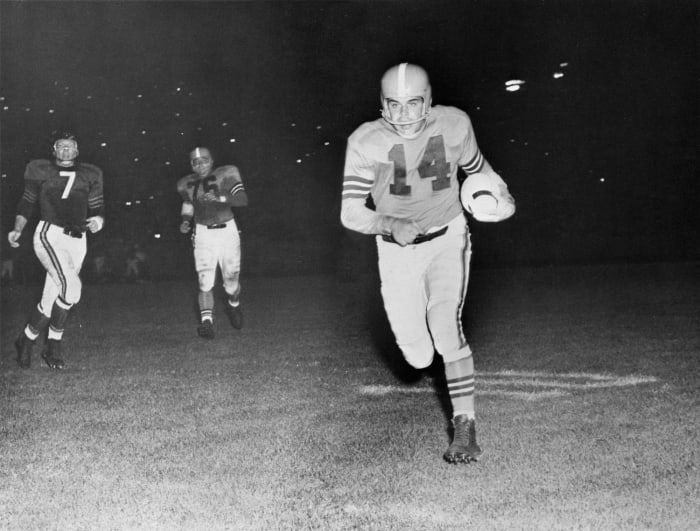
Another legend from the pre-Super Bowl era. Graham is one of the greatest athletes in the history of professional sports and a legend in Cleveland, where, between the AAFC and NFL led the Browns to championships in 1946, '47, '48, '49, '50, '54, and '55. Those three in the 1950s came in the NFL, where the legendary Graham went 4-3 in playoff games. In those NFL postseason contests, Graham threw for 1,204 yards, 10 touchdowns, 13 interceptions and ran for 292 yards with five more scores.
Bob Griese

Griese played in three Super Bowls and helped the Miami Dolphins win back-to-back titles in VII and VIII. The former capped Miami's historic 14-0 season of 1972. For his stellar NFL career, Griese played in 12 playoff games, won seven and threw for more than 1,400 yards. Though Griese would be considered a game-manager under center in this era of the NFL, he commanded respect for his on-field intelligence and leadership skills. Thus making him worthy of postseason celebration.
Jim Kelly

Yes, we know Kelly led the Buffalo Bills to four consecutive Super Bowls -- all losses -- during the 1990s. However, just that type of track record in getting to the Super Bowl in a consistent fashion is remarkable. Throw out those Super Bowls, and Kelly is 9-4 in playoff competition. Overall, in the postseason, Kelly has thrown for 3,863 yards with 21 touchdowns (against 24 interceptions, seven in the Super Bowl) and remains beloved in Buffalo.
Sid Luckman

The Chicago Bears have not had much luck at the quarterback position during the history of the storied franchise, so it's understandable why many NFL historians consider Luckman the franchise's greatest signal-caller of all time. Luckman helped the Bears to four NFL Championships (1940 , 1941, 1943, 1946). He went 5-1 in the playoffs, throwing for more than 700 yards with seven touchdowns (including five during the '43 Championship win over Washington) and four interceptions.
Patrick Mahomes

It's quite possible before Mahomes' sensational NFL career comes to an end, he will be considered the greatest playoff quarterback of all time. Eight seasons into his career, Mahomes is certainly in the conversion. Entering the 2024 campaign, the Kansas City Chiefs star is tied for fourth in NFL history with four Super Bowl appearances, and three victories. He's guided the Chiefs to six AFC Championship Game appearances, with a seventh possible in 2024-25, and enters this season's playoffs third with 15 wins. Mahomes' 105.8 career playoff passer rating is an NFL record, while his 67.9-percent postseason completion percentage is the highest among those with at least 10 appearances.
Eli Manning
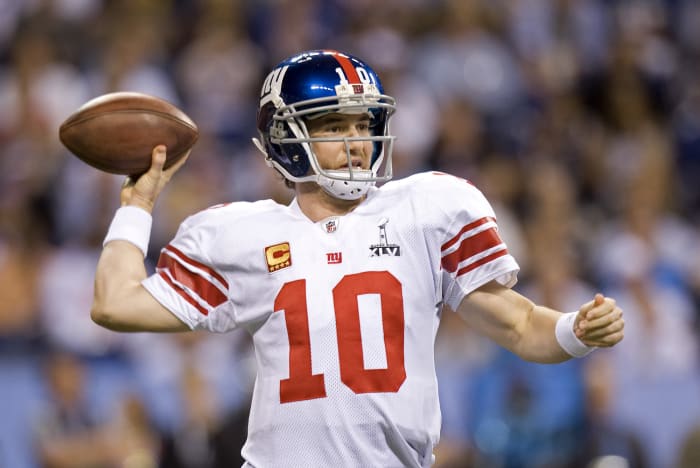
For years, Eli played in the shadow of brother Peyton (more on him shortly). However, Eli became the first in the Manning family to win two Super Bowls, and is one of five players to earn at least two Super Bowl MVP awards. Manning completed 66.2 percent of his passes for 551 yards and posted a 96.2 passer rating in those two Super Bowls. He posted an 8-4 playoff record, throwing 18 touchdowns and nine interceptions while playing only three of those contests at home.
Peyton Manning
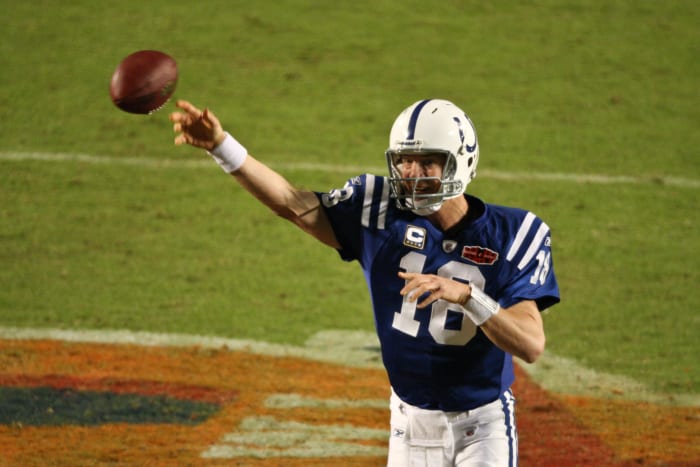
A two-time Super Bowl champion, Manning joins Tom Brady as the only players to win the league's ultimate prize with two different teams (Indianapolis and Denver). In addition, Manning trails only Brady in career playoff appearances (27), completions (649) and passing yards (7,339). Manning also ranks among the NFL postseason leaders in victories (14) and touchdown passes (40). He appeared in four Super Bowls, and was named XLI MVP while winning his first such appearance against the Chicago Bears.
Joe Montana

Before Tom Brady, the general consensus was that Montana claimed the title of NFL's greatest playoff quarterback. A star in the clutch, Montana led the San Francisco 49ers to four Super Bowl titles in as many appearances, and entering the 2024 season playoffs, he ranked second with 16 victories. Montana was the first player to win three Super Bowl MVPs and his 127.8 career passer rating is the highest in Super Bowl history. Montana was featured in 23 playoff games, throwing for 5,772 yards and 45 touchdowns -- the latter tied for second all-time.
Jim Plunkett

It's one of the great playoff success stories. Plunkett had a career resurgence, achieving remarkable success, when he landed in Oakland in 1979. The next season, Plunkett led the Raiders to an improbable run to winning Super Bowl XV, for which he was named MVP (one of four Heisman Trophy winners to also earn that Super Bowl honor). Three seasons later, with the Raiders now housed in Los Angeles, Plunkett again was a Super Bowl-winning quarterback. During his 10 playoff appearances as a starter, Plunkett went 10-2 and threw for nearly 2,300 yards. According to the NFL, Plunkett is currently the only eligible quarterback to win multiple Super Bowls and not be inducted into the Pro Football Hall of Fame.
Aaron Rodgers

One wonders if Rodgers will make another playoff appearance. If not, his postseason legacy remains pretty solid among the best in the game. Like fellow Green Bay legend Brett Favre, Rodgers owns just one Super Bowl crown -- winning XLV and MVP honors while throwing for 304 yards and three touchdowns against Pittsburgh. However, that's his only Super Bowl appearance to date, and he's 12-10 in the postseason. That said, Rodgers is among the NFL postseason leaders in games (22), completions (501), completion percentage (64.7), passing yards (5,894), passing touchdowns (45), and passer rating (100.1).
Ben Roethlisberger
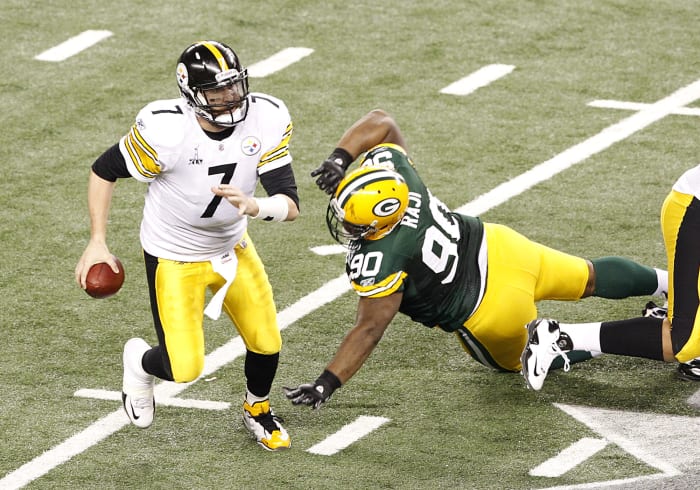
Another two-time Super Bowl champion and one of the most potent passers in league history. Roethlisberger led Pittsburgh to three Super Bowls, and is tied for fourth with 23 playoff appearances. He also ranks among the NFL's career playoff leaders in victories (13), completions (498), passing yards (5,972) and touchdown passes (36). Roethlisberger played in five AFC Championship Games, and began his playoff career with a 10-2 record.
Bart Starr

When it comes to NFL postseason greatness before and during the Super Bowl era, there aren't many better than the legendary Bart Starr. The Green Bay superstar was a five-time NFL champion (1961, 1962, 1965-'67), then guided the Packers to victories in Super Bowl I and II. Starr was the MVP of those first two Super Bowls, and went 9-1 in postseason play. He threw 15 touchdowns, just three interceptions and his only playoff rushing TD came in the famous "Ice Bowl" victory over Dallas in the '67 NFL Championship. Starr's 104.8 playoff passer rating ranks second-best all time.
Roger Staubach

This Dallas Cowboys legend was part of five Super Bowl teams for the franchise, and he started four of those games. Staubach, 11-6 as a playoff starter, helped lead the Cowboys to victory in Super Bowl VI and XII. He earned MVP honors in the former when he threw a pair of touchdowns against Miami to conclude the 1971 season. For his postseason career, the venerable Staubach threw for 2,791 yards with 24 touchdowns and 14 interceptions.
Johnny Unitas

Like Bart Starr and Len Dawson, Unitas thrived before and during the Super Bowl era with the Baltimore Colts. He won three NFL Championships (1958, 1959, 1968) and also led the Colts to victory in Super Bowl V. During that '58 title tilt, dubbed the "Greatest Game Ever Played," Unitas led the Colts to a 23-17 overtime win against the New York Giants. Unitas, also on the losing end of Super Bowl III against Joe Namath and the New York Jets, went 6-2 as starting playoff quarterback.
Kurt Warner

Arguably the greatest undrafted player in NFL history, Warner led both the St. Louis Rams and Arizona Cardinals to the Super Bowl. In his Cinderella first year as a starter in 1999, Warner guided the Rams to a victory in Super Bowl XXXIV, where he also won MVP while throwing for 414 yards and two touchdowns. Warner, who lost his next two trips to the Super Bowl, posted a 9-3 playoff record, and ranks among the NFL postseason leaders with a 66.5 completion percentage, 3,952 passing yards, 31 passing touchdowns and a 102.8 passer rating.
Russell Wilson

Wilson will pad his postseason numbers, now with the Pittsburgh Steelers, for the 2024 playoffs. Entering this postseason, Wilson has thrown for nearly 3,800 playoff yards with 25 touchdowns and a 95.3 passer rating. He's appeared in two Super Bowls, guiding Seattle to a victory in XLVIII against Denver. In those two Super Bowl games, Wilson completed 65.2 percent of his passes for 453 yards with four touchdowns and an interception.
Steve Young

Out of Joe Montana's shadows with the San Francisco 49ers, Young eventually became a postseason legend in his own right. He has three Super Bowl rings, but only one came as a starter. However, Young was named MVP of Super Bowl XXIX when he went 24-of-36 for 325 yards with a record six touchdown passes and also led the 49ers with 49 rushing yards in a 49-26 victory over San Diego. As a postseason starter, Young threw for 3,118 yards with 19 touchdowns and 14 interceptions and ran for 516 yards with another seven scores while posting an 8-6 record.
More must-reads:
- Five NFL Draft prospects that make Eagles repeat Super Bowl favorites
- QB Patrick Mahomes names one area where Chiefs offense must improve
- The 'First running backs taken in every NFL draft since 2000' quiz
Breaking News
Trending News
Customize Your Newsletter
 +
+
Get the latest news and rumors, customized to your favorite sports and teams. Emailed daily. Always free!
PRIVACY POLICY EDITORIAL POLICY CONTACT US
ABOUT YARDBARKER TERMS OF SERVICE
Use of this website (including any and all parts and
components) constitutes your acceptance of these
Terms of Service and Privacy Policy.
This site is for entertainment purposes only.
There is no gambling offered on this site.
Gambling Problem? Call 1-800-Gambler.








